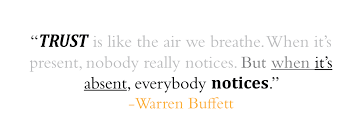Trust
Steven M Covey in the book The Speed of Trust states that companies that have high trust outperform low trust companies by as much as 286%. To get that level of performance, the employees are fully engaged. What does trust have to do with engagement? Everything! Trust is the foundation from which everyone builds relationships.
According to Harvard psychologist Amy Cuddy, the first things people subconsciously think during first impressions are: 1) Can I trust you? 2) Can I respect you? Trust is the beginning and the mortar of a relationship. Warren Buffett comments that it can take 20 years to build trust, but trust can be lost in 5 minutes through an untrustworthy act.
Trust is the foundation from which all relationships are built. People are not judging you on your competence first; they want to trust and respect you first, then they are open to learn about your competence. Trust is personal first. Then trust can be on the competence level, i.e. Are you competent in what you do?
Recognition
According to Paul Zak in Jan-Feb Harvard Business Review article, The NeuroScience of Trust, recognition of excellence is a huge engagement booster.."that recognition has the largest effect on trust when it occurs immediately after a goal has been met, when it comes from peers, and when it’s tangible, unexpected, personal, and public. Public recognition not only uses the power of the crowd to celebrate successes, but also inspires others to aim for excellence. And it gives top performers a forum for sharing best practices, so others can learn from them."

A second way to improve engagement is to give trust. Trust your employees to do things right. If you are always micro-managing them, then you are showing a level of insecurity and also demotivating them. People want to be trusted. The more trust you instill in an employee, the more they have opportunity to rise to the level of expectation. Covey and Zak both talk about how all humans have an innate desire to be trusted. All people want trust extended to them. Zak states in HBR "Once employees have been trained, allow them, whenever possible, to manage people and execute projects in their own way. Being trusted to figure things out is a big motivator: A 2014 Citigroup and LinkedIn survey found that nearly half of employees would give up a 20% raise for greater control over how they work."
As a leader, sales person, even spouse, to ensure you maintain trust, be quick to admit when you are wrong. Ask forgiveness and be specific about what you are asking forgiveness. A fake or insecere apology creates distrust. Make restitution where it is necessary; do not blow off something that could be huge in trust for another person.
Other ways to create more trust:
- Talk Straight – no spin, honesty and upfront on your agenda
- Show Respect – dignity and feelings of others, show kindness
- Be Transparent – show the facts in a way that can be verified
- Show Loyalty – give credit where credit is due, no bad mouth
- Deliver Results – track record of getting the right things done
- Get Better – improve personal capabilities, re-learn
You want more engagement?
To get more engagement focus on being a trustworthy leader. To increase your closing ratio and getting more referrals, focus on being a trustworthy person.


